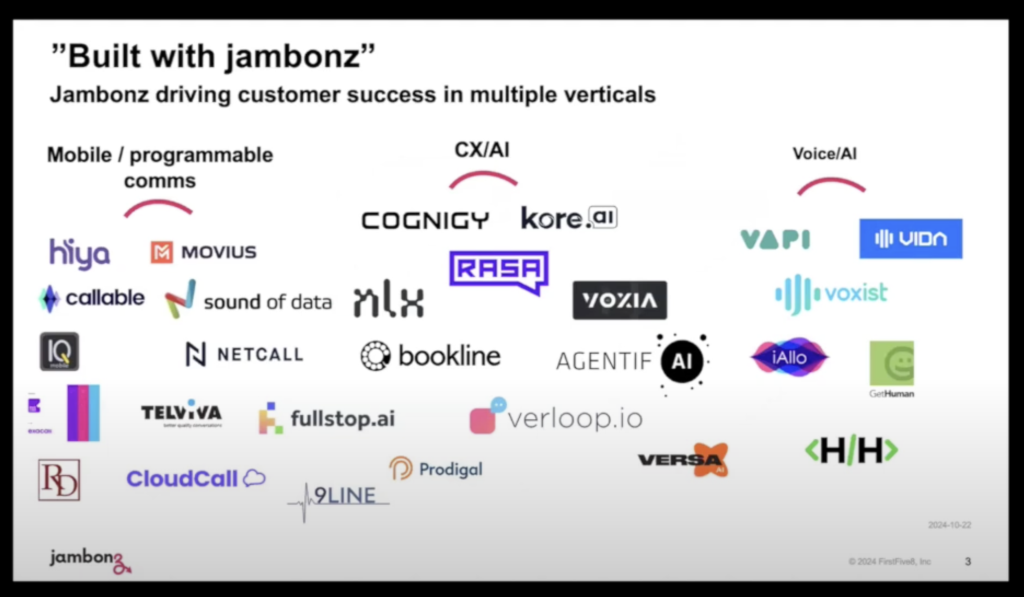Dave Horton is the creator of jambonz, the open source voice gateway for CX/AI; and drachtio.org, the open source framework for SIP Server applications.
This is an interesting presentation as Dave pivots from the usual platform / technology focus to a business focus.
Dave frames what jambonz will become: like Intel, Gore Tex, Vibram and Dolby Digital. Jambonz objective is to become an ingredient brand. You buy a hiking jacket, as it has the Gore Tex tag, the walking shoe as a Vibram sole, the PC has an intel inside. The product is elevated by the ingredient brand, over a no-name brand.
I’d argue Jambonz is an ingredient brand today. Cognigy is elevated as a brand, because I know is has Jambonz inside. A platform with decades of hard won voice experience. I’ve witnessed Jambonz used in hacks around the world through TADHack.
Dave highlights most of the panelist in the TADSummit panel discussion use Jambonz, “Are LLMs about to disrupt enterprise SaaS (Software as a Service)?” Jambonz is carrying millions of calls in Fortune 50 businesses through its partners.
TADSummit Panel Discussion. Are LLMs about to disrupt enterprise SaaS (Software as a Service)? Karel Bourgois, Founder & CEO Voxist; Paul Sweeney, Co-Founder and Chief Strategy Officer, Webio; Lyle Pratt, Vida.io Founder & CEO; Nikhil Gupta, Founder, CTO @ Vapi (YC W21); RJ Burnham, Founder & CEO at Consig AI.
This is the logo slide I’ve been waiting for. From cool new brands to large established ones. Sound of data does the voting for the EuroVision song contest, a large dynamic range in load. Cognigy and Kore.ai are in the large global enterprise league, and use Jambonz as their voice gateway. So need reliability, performance, and guard rails.
While also the ‘cool new innovators’ also use Jambonz to help them move off Twilio. It’s truly the breadth of the market. Jambonz is at the intersection of voice, AI, and telephony. All customers are feeding back many new features.
Why has Jambonz been so successful? Excellent product market fit. Dave uses the analogy like buying a car with an engine (voice) in another place. Jambonz enabled the engine to be in the car, hence a complete solution. So the Fortune 500 company as everything on site, and one vendor to solve any problem that arises. And Jambonz is malleable, configure and customize to the specific customer’s needs.
Dave introduces FirstFive8, the commercial entity. Manages the projects and community, delivers commercial services, owns the software copyrights and IP, and is self-funded, cash flow positive, and growing. Woohoo!
The team is now 6 people, and provides 7/24 global support. FirstFive8 is not an open source company, its focus is selling the tools for those in the AI gold rush, that is:
- Cost effective and scaleable telephony
- Widest range of speech and LLM integrations
- Best in class dev environment
- Deep telephony and voice expertise.
Dave has focused on organic growth, avoiding investor pressure. I’ve seen some telephony open source projects get dumped because investors wanted their exit. The interesting thing is FF8 does award 2% of equity to partners and initial customers. It’s an interesting model. Making money with open source in telecom related projects is a challenge, compared to web and IT domains. However, Dave seems to have found a way, where people who bet on him see a return, beyond being powered by Jambonz.


2 thoughts on “How Drachtio and Jambonz are changing the World of Programmable Telecoms. Dave Horton”
Comments are closed.